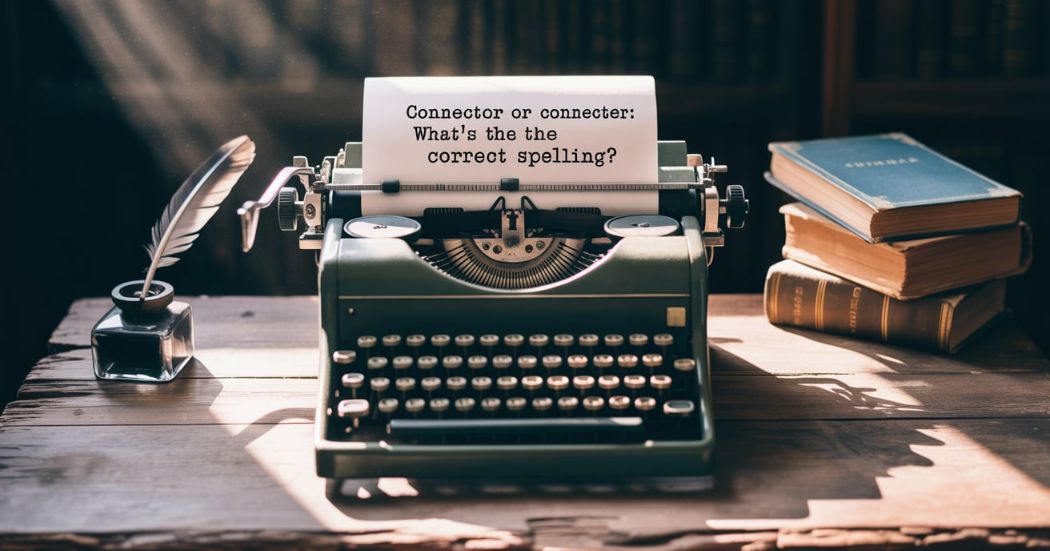The English language is full of words that look and sound similar but can lead to confusion. One such pair is “connector” and “connecter.” If you’ve ever found yourself hesitating while typing one of these, you’re not alone. These words seem interchangeable, but is one of them more correct than the other? Let’s unpack their differences, usage, and how to use them properly in different contexts.
The Quick Answer
“Connector” is the more commonly accepted and widely used form in modern English. While “connecter” is not technically incorrect, it is rarely used and often perceived as a spelling error, especially in American and British English.
Think of it this way: if you’re unsure, go with “connector”—you’ll almost always be safe.
Origins of the Words
Both “connector” and “connecter” come from the verb “to connect,” meaning to join, link, or fasten things together. The suffix “-or” is traditionally used in English to form agent nouns—words that describe someone or something that performs an action. For example:
- A person who acts is an actor
- Something that compresses is a compressor
- A device that connects? That’s a connector
So, why does “connecter” exist at all? It turns out that “-er” is also a valid English agent suffix (as in “runner” or “teacher”), and for some words, both forms coexist or compete. However, with “connect,” the “-or” ending has clearly won the popularity contest.
Frequency and Popularity in Usage
Let’s look at how these words appear in actual usage.
- Connector is found in technical writing, engineering, electronics, linguistics, and even social discussions. You might read about a USB connector, a connector between two highways, or someone who is a natural connector of people.
- Connecter, on the other hand, is rarely seen. In fact, spell checkers often mark it as incorrect. It does appear occasionally in older texts or niche writing, but it’s not widely accepted.
According to Google Books Ngram Viewer, the use of “connector” vastly outnumbers “connecter” from the 1800s to the present day.
Examples in Real-life Scenarios
To fully understand the distinction, let’s dive into a few scenario-based examples to see how each term might be used—and why “connector” is the better choice.
Scenario 1: In Technology
Correct:
“We need to replace the HDMI connector on the back of the TV.”
Questionable:
“We need to replace the HDMI connecter on the back of the TV.”
In technical contexts—such as electronics, IT, or engineering—the word “connector” is the industry standard. Whether you’re referring to a USB port, an audio jack, or a cable fitting, “connector” is the form professionals expect.
Scenario 2: In Social or Professional Networking
Correct:
“Jake is a natural connector—he’s always introducing people to each other.”
Awkward:
“Jake is a natural connecter—he’s always introducing people to each other.”
Here, the noun is being used metaphorically to describe someone who brings others together. “Connector” in this context draws from Malcolm Gladwell’s book The Tipping Point, where he describes a Connector as a person with a special gift for bringing the world together. It’s a term that has taken root in business and social psychology.
Scenario 3: In Construction or Architecture
Correct:
“The steel connector holds the beams firmly in place.”
Incorrect:
“The steel connecter holds the beams firmly in place.”
Once again, “connector” is the established term in industries like construction. Whether it’s a joist connector, pipe connector, or bridge connector, professionals use the “-or” form.
Linguistic Perspective
Why is the “-or” suffix favored here?
From a linguistic standpoint, Latin-derived verbs that end in “-ect” often form agent nouns with “-or” rather than “-er.” This is why we have:
- Inspector (not inspecter)
- Director (not directer)
- Connector (not connecter)
“-Or” suffixes tend to appear in more formal or technical terms, which helps explain why “connector” dominates in professional and technical settings.
Regional and Historical Differences
Some may argue that “connecter” appears more often in older texts or may be more acceptable in specific dialects or regions. However, even in those cases, “connector” is far more common and recognizable.
You might come across “connecter” in older documents or in informal writing, especially in regional dialects or among ESL (English as a Second Language) learners who apply regular English spelling rules. But this doesn’t make it standard.
Common Confusions and Tips to Avoid Them
Here are a few quick tips to help you avoid using the wrong form:
- If you’re writing professionally, especially in technical, business, or academic contexts—always use “connector.”
- If a spell checker flags “connecter” as a typo, it’s likely because the term is rare or nonstandard.
- If you’re unsure which form to use, remember other common “-or” agent nouns—like editor, inventor, or actor—and you’ll be guided to the right choice.
Memory Trick to Remember
Here’s a simple mnemonic to keep things straight:
“OR is more popular.”
The “-or” suffix is more commonly accepted for this kind of noun, and it helps you remember to use “connector.”
Final Thoughts
When it comes to “connector” vs. “connecter,” the verdict is clear:
👉 “Connector” is the correct, standard, and widely accepted form in virtually all settings.
👉 “Connecter” is technically a word but is rarely used and often seen as an error.
Unless you have a very specific stylistic reason or historical text referencing the word “connecter,” it’s best to stick with “connector.”


